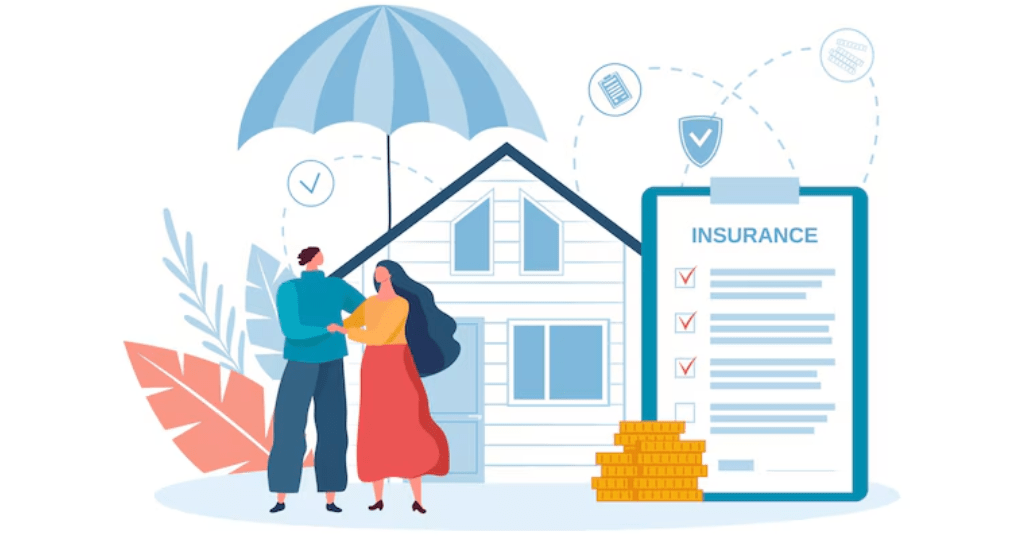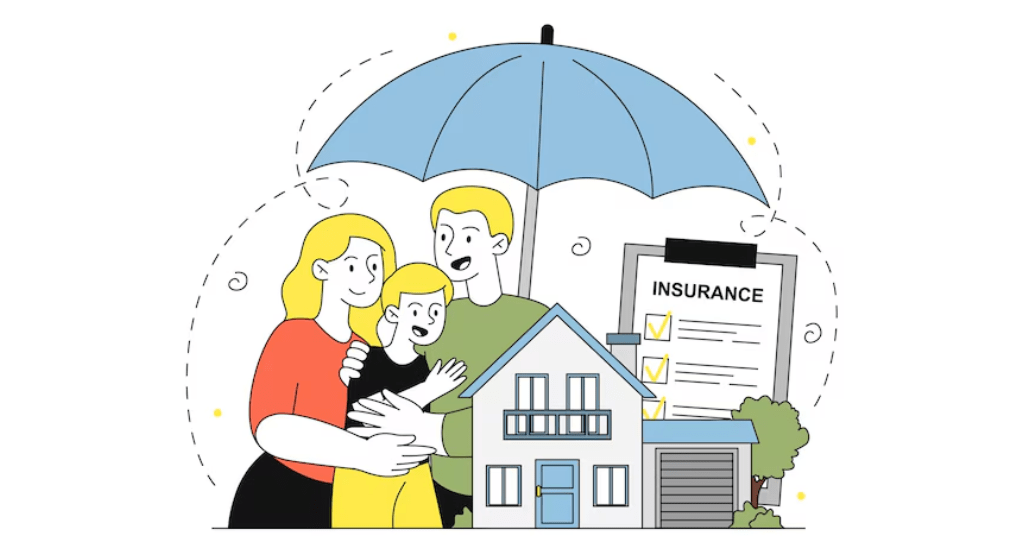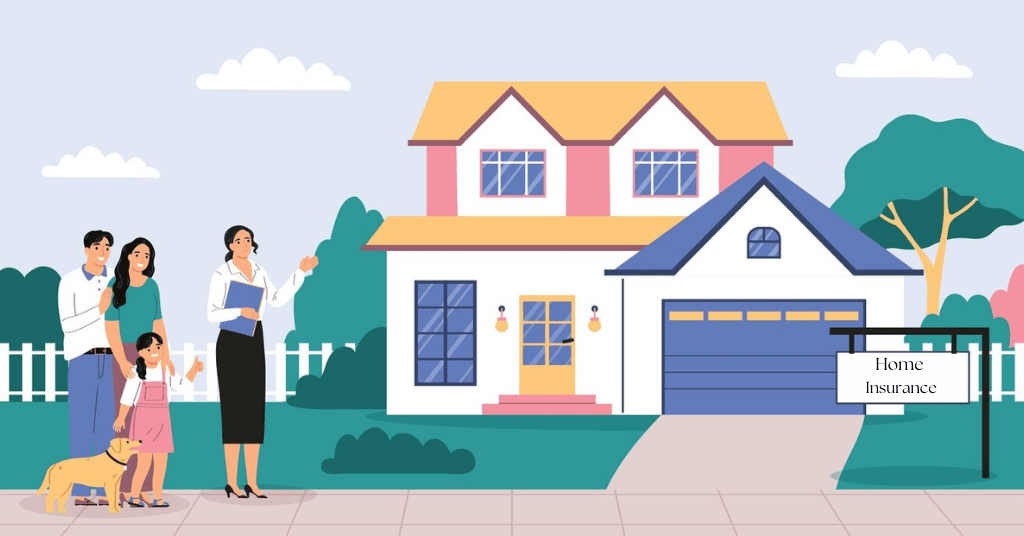How to Save Money on Your Home Insurance – Home insurance serves as a safety net to protect the homeowner against unanticipated financial losses due to damage, theft, or natural disasters. But the premiums for home insurance can be heavy to bear, especially at a time when household budgets are strapped. So, it becomes a puzzle for most homeowners who wonder how they could minimize these costs without giving up on quality coverage.
But in good news, there are many ways to reduce one’s home insurance costs. All it takes is a thorough knowledge of how premiums are generated, taking advantage of what is available, and making decisions which put you in the best light of mind-set. Whether you are just setting up a new policy or renewing an existing policy, this article will step through some practical steps to enable you to save money by putting your home in the right place.
How to Save Money on Your Home Insurance –
Understanding Home Insurance Premiums –
To save effectively on home insurance, it is important to know what determines your premiums. Insurers calculate your premiums using several factors, including location, construction material, the age of the house, and proximity to risks like flood zones or fire-prone areas. Other factors, such as the cost to rebuild your home, the level of coverage you choose, and your personal claims history, also play a significant role.

Home Insurance Premiums
For instance, a house in a more dangerous location or one constantly exposed to natural disasters can cost more. In a similar vein, houses whose construction material and systems date back, say, to 20 years ago may cost more due to higher risks. A home with new safety features will be attractive to discounts and can therefore attract discounts as well. With these factors, you will be able to understand how you can lower costs.
For example, updating your home with safer materials or installing a fire alarm system can make your property less risky and more affordable to insure.
How to Save Money on Your Home Insurance –
Shop Around and Compare Policies –
Probably one of the best ways to save money on home insurance is to shop around. The pricing models used by different insurance providers are not always the same, meaning that the premium for the same level of coverage will differ significantly between companies. To get started, gather quotes from at least 3 insurers. Online comparison tools make this fairly easy, allowing you to evaluate plans side by side. Be sure to carefully examine what each policy offers. The cheapest policy could omit coverage that is a critical need, meaning there may be higher out-of-pocket costs in the event of a claim.

Shop Around and Compare Policies
For instance, consider talking to independent insurance brokers who might help you negotiate the market to find a policy that fits your needs. Typically, the brokers have exclusive deals and can even make the process of comparison less complicated. Compare policies by not only focusing on price but also coverage limits, exclusions, and customer reviews about the insurance company. A high-rated insurance company may pay a bit more in premiums but will be worth it for better service and quicker settlement of claims.
Increase Your Deductible –
One of the easiest ways to reduce premiums is by increasing the deductible. The deductible is an amount you commit to paying before your insurance covers the rest in the event of a claim. A good example is if you have a $500 deductible for your policy and you increase it to $1,000; this can save up to 20-30% on the premium. This option would reduce monthly or annual costs; however, ensure you have the necessary amount to afford the deductible if an emergency should arise. It is worth weighing all the factors in this decision on a case-to-case basis before making a judgment. Should you have enough savings set aside in the event of increased deductibles, this can be a prudent way in which you achieve long-term savings on insurance.
Bundle Insurance Policies –
Bundling multiple insurance policies with the same provider can save you a lot of money. Many companies offer discounts of 10-25% when you bundle home insurance with other policies, such as auto or life insurance. Bundling tends to make handling finance pretty simple in that you get one number to work from since several policies are put under cover of a single insurer, but first establish whether that total cost on these bundled policies is really cheap than their individual costs and often may not offset higher premium with one of your bundled insurance policies.

Bundle Insurance Policies
Ask your insurer about the specific benefits of bundling, and periodically review your policies to ensure they continue to provide adequate coverage and value.
Enhance Home Security –
Improving your home’s security is a win-win strategy; it protects your family and belongings while also lowering your insurance premiums. Most insurers offer discounts for installing safety features like burglar alarms, smoke detectors, and fire suppression systems. Even better savings may be achieved through advanced systems, such as monitored alarm services or smart home security. For instance, installing surveillance cameras or motion detectors can cut premiums by as much as 10-15%. Discuss with your insurer which upgrades qualify for discounts and make sure they are installed professionally.
Maintain a Claims-Free Record –
Avoid making unnecessary claims in order to keep your premium low. In most policies, it is said that the reward for having a no-claims bonus or discount.
For example, if 5 years elapse without your filing of claim, your premium would have been rewarded with 20%. Whenever possible, perform minor repairs yourself to keep your claims history clean. Also, note down the maintenance and improvement work done on your house. This can act as proof of improvement for any reduction or low premium quotation in case of a policy review.
Consider Policy Customization –
Perhaps one-size-fits-all does not cut it when you are looking for home insurance. You can tailor your policy to avoid paying too much for unwanted features.

Consider Policy Customization
For example, if you reside in an area that rarely floods, you may skip flood insurance and concentrate on other crucial covers. Review your policy annually to ensure it reflects your current situation. If you have added new security features or made renovations, you should inform your insurer since these updates can qualify you for discounts.
Leverage Discounts and Loyalty Programs –
Insurance companies generally offer many discounts to policyholders. There are early-bird discounts for renewing your policy before it expires, loyalty rewards for staying with the same company, and new customer incentives. Call your insurance company to find out secret discounts and loyalty programs and eventually learn which periods for renewal or policy renewal tend to be more advantageous.
Improve Your Credit Score –
Your credit score is one critical determinant in the computation of your insurance premiums. With a higher credit score, comes a better history of financial stewardship, and therefore there is less risk of failing to pay. Improve Your Credit Score; Pay bills before they are past due, minimize outstanding debts and avoid the opening of multiple credit accounts. Check and dispute any errors on your credit report.
Evaluate Replacement Costs vs. Market Value –
Understanding the difference between replacement cost and market value is crucial for choosing the right coverage. Replacement cost refers to the expense of rebuilding your home from scratch, while market value includes the land value and the home’s resale potential. Insuring your home for its replacement cost ensures you will have sufficient funds to rebuild after a disaster. Periodically review these figures to avoid overpaying or underinsuring your property.
Conclusion –
Following these strategies, you would be able to reduce home insurance premiums greatly while covering all your property. Paying less in insurance bills involves a bit of forward planning, which includes making comparisons between different policies and enhancing home security. Always take time to examine your need for coverage and discover cheaper policies.
How to save money on your Home Insurance in California –
Home insurance is a very important safety blanket for homeowners, which saves against financial loss due to damage, theft, or even a natural disaster. In California, which experiences so many different environmental challenges ranging from wildfires and earthquakes to floods, having solid home insurance is vital. Nevertheless, home insurance costs can often seem oppressive to homeowners, especially those in the higher-risk areas. Fortunately, there are various strategies and considerations that would cut the costs of your premiums with minimal compromises on coverage. Knowledge about how insurance rates are formed will help homeowners in California in achieving considerable savings on policies.

Home Insurance in California
One of the most relevant factors in determining home insurance is the location of the property. Locations with a history of wildfires may require higher premiums in California, and homes near fault lines, while not necessarily at a loss, may also have to pay more for their insurance. To reduce these costs, one may invest in measures designed to reduce the risk of destruction of your property. Installing fire-resistant roofing, thus creating defensible spaces around your home, and keeping up with local fire codes will show insurance providers that your home is unlikely to suffer significant loss and damage, hence lowering your rates. Secondly, some of the insurers offer discounts on homes which are installed with a smoke detector, sprinkler system, and burglar alarm. This investment in these safety upgrades will not only protect your home but may even make it more attractive to potential insurers.
The choice of insurance provider also plays a significant role in determining your premium. Californian homeowners can choose between a wide range of insurance companies, each offering different pricing structures and coverage options. Shopping around and comparing quotes from multiple providers is, therefore, essential to ensure you get the best deal. Online comparison tools and working with independent insurance agents can simplify this process. It is also worth asking about any available discounts, such as those for bundling home insurance with other policies like auto insurance. Bundling can lead to substantial savings and is a practical way to streamline your coverage.

Home Insurance in California – 2
Your credit score is another factor that may influence your home insurance premiums. While not all insurers in California consider credit scores, many do, and a higher score often correlates with lower rates. Paying bills on time and keeping the outstanding debt low will improve your credit worthiness, thus reducing your premium costs. Over time, the ability to maintain good credit positively affects insurance rates. For consumers concerned about the implications of credit scores in their insurance costs, finding providers that do not use credit as a pricing factor may be helpful.
The deductibles and limits you settle on determine a big percentage of how much you will be charged for your home insurance. Increased limits offer better coverage and mean paying higher premiums. However, for this, one must have assessed what the real coverage requirements are. Have a stock take of the belongings and identify valuables like jewelry, electronics, and artworks. Know the replacement costs. Over-insuring can help to eliminate some excess in this aspect. Similarly, choosing a higher deductible-the sum you must pay in advance before your insurance coverage sets in-will reduce your premium. But remember that you want to select a deductible that you can actually afford if a claim arises.

Home Insurance in California – 3
Another way to save on home insurance in California is to review your policy regularly and make changes as and when needed. Some changes in life may make a difference in the insurance you need. For example, upgrading to a roof that is more durable or installing energy-efficient windows may qualify you for discounts. If you have paid off your mortgage, you no longer may need certain coverages that your lender previously required. You will review your policy yearly with your insurance agent and avoid paying for any unnecessary coverage. You will be able to take advantage of the government’s programs and initiatives and have the opportunity to lower your home insurance cost. California, for instance, offers its California FAIR Plan for those who find it challenging to obtain coverage in high-risk areas. While the FAIR Plan is generally more expensive than standard policies, it can provide an alternative for those who are unable to obtain coverage through other means. In addition, some counties and local governments offer incentives for taking steps to mitigate the risk of wildfires, which may help offset the cost of reducing your home’s risk profile.
In managing home insurance costs effectively, it is equally important to educate yourself about common exclusions and limitations of policies. Many standard policies in California do not cover earthquake or flood damage, so you will probably need separate policies for those. If you live in a high-risk zone, purchasing these additional coverages might be necessary, but for most of you, it would be an unnecessary expense. Careful analysis on your house location and potential risks will allow you to make the best-informed choice about which additional coverages will be worth your money.

Home Insurance in California – 4
You can also save through time by having a long-term relationship with your insurance provider. In fact, most insurers provide loyalty discounts to their customers if they renew their policies year in and year out. However, you still need to review your policy and compare it with other options every now and then. And even if you want to change insurance providers, continuous coverage without lapses will always be beneficial in preventing higher premiums when renewing in the future.
In conclusion, saving money on home insurance in California requires a proactive and informed approach. It is important to understand what factors influence insurance costs and how to reduce risks to make your home more insurable, hence securing lower premiums. There are several ways to achieve significant savings, from investing in safety measures and comparing providers to optimizing your coverage and taking advantage of discounts. As a homeowner, staying engaged with your policy and regularly reassessing your needs will not only protect your financial well-being but also provide peace of mind in an unpredictable world. By implementing these strategies, Californians can ensure they receive comprehensive protection for their homes without overburdening their budgets.
Read Also Another Article –
How to Choose the Right Home Insurance for You
How to Choose the Right Insurance for Your Business
Frequently Asked Questions –
Q. 1. What are the best strategies to reduce home insurance premiums?
Ans – The best strategies to cut your home insurance premiums include shopping around for competitive quotes, bundling your home insurance with other policies like auto insurance, and increasing your deductible to lower monthly or annual costs. Installing safety features such as smoke detectors, burglar alarms, and fire suppression systems will cut premiums by minimizing risks. Maintaining a claims-free record and improving your credit score can lead to considerable savings since insurers often reward financially responsible behavior. You can customize your policy to avoid unnecessary add-ons and review coverage regularly to ensure you are not overpaying for outdated or excessive protection. Further cost reductions can be achieved by utilizing insurers’ loyalty programs and any available discounts.
Q. 2. How does increasing the deductible affect home insurance savings?
Ans – Significant premium reductions are achieved by raising the deductible, or the amount you pay before your insurance covers the remaining amount. If you select a higher deductible, an insurer perceives you to be less likely to submit minor claims, reducing your premium and, hence their risk. For instance, an increase in the deductible from $500 to $1,000 can save you as much as 25 percent yearly. However, for this strategy to work you need to pay attention to your financial condition because deductibles need to be borne in case of a claim. Although the monthly savings are beneficial, it goes hand in hand with ability to absorb unforeseen spends.
Q. 3. Can bundling insurance policies help save on home insurance costs?
Ans – Bundling of other kinds of insurance, that include home and auto, provides substantial savings on premiums. Most insurance companies usually award discounts of 10 to 25% for its customer who buys several packages offered by the same. At the same time, not only does this mean low cost but also ease and effectiveness in management as these come under one cover only. It is therefore paramount in comparing the total of both bundled and individual policies to understand which one saves. Determine whether the coverage you will need is available for all items that you insure. Selecting the appropriate provider with bundling options will offer you savings as well as saving you time.
Q. 4. How do home safety upgrades impact home insurance premiums?
Ans – Upgrading the home with safety measures has an immense impact on decreasing the cost of premiums of home insurance. This can include such features as burglar alarms, smoke detectors, fire sprinklers, and strengthened doors to deter potential thieves from breaking in. In addition, all such measures help the insurance company minimize risks, so the insurers will usually reduce premiums up to 15%. More sophisticated security measures, like alarm services or smart home devices, could also reduce your premiums further. Consult with your insurer to determine which improvements qualify for a discount and should be installed by professionals to maximize the benefit of improvements to your home, both to safety and financially.
Q. 5. What factors influence the cost of home insurance premiums?
Ans – Such home insurance premiums are influenced by several factors, including; the type, age, and construction of material utilized in building your home and its proximity to risks in the form of flood-prone zones or wildfire-sensitive areas. Your replacement home cost, coverage limits and claims history also play majorly. Personal factors, the form in which your credit score shapes who are ready, as insurers use credit-worthiness assessments towards defining such measures of financial responsibility. Other variables that affect price are your deductible amount and whether there are safety features on the premises. Knowing these things can alert the home owner to other things, for instance putting a security system into his house or having a high deductible so one would cut some extra from insurance premium payments.
Q. 6. Is it possible to save money on home insurance with a claims-free record?
Ans – Maintaining a claims-free record is one of the most reliable ways to cut homeowner’s insurance costs. No-claims bonuses or discounts are offered by insurers to policyholders who do not file claims. This means that with time, no-claims bonuses can help reduce your premiums considerably.
For example, you might get a 10-20% discount for staying for several years without filing a claim. To keep your record clean, settle small repairs out-of-pocket instead of filing small claims. Proper home maintenance prevents damage and, thus, lowers the chances of having to file a claim. By keeping your claims history clean you would not only save on premiums but would also become eligible for better rates.
Q. 7. How does customizing a home insurance policy save money?
Ans – Home insurance customizes to help you save money because it ensures that you pay for coverage according to your specific needs. For example, if you do not stay in a flood-prone area, you can eliminate flood insurance, thus saving you the premium amounts. Adjusting the limits of coverage according to the value of your home and excluding unnecessary add-ons also prevent overpayment. Reviewing and updating it regularly, including changes, such as renovations or putting in safety upgrades, ensures the policy remains cost-effective. Customization also brings peace of mind, as you will not over-insure something you do not need and ensure adequate protection for what matters the most.
Q. 8. How does a good credit score impact home insurance costs?
Ans – A good credit score will significantly reduce home insurance. Insurance companies use credit-based insurance scores to determine how likely the policyholder is to make a claim. The better the credit score, the more financially responsible one is, which reduces risk for the insurer and thus generally means lower premiums. A better credit score involves timely payments of bills, debt reduction, and checking credit reports for errors. Not only do you benefit on the side of homeowners’ insurance rates but also through your general financial position while working regularly on credit health. You benefit from more affordable and competitive insurance premiums as your credit score is stronger.








